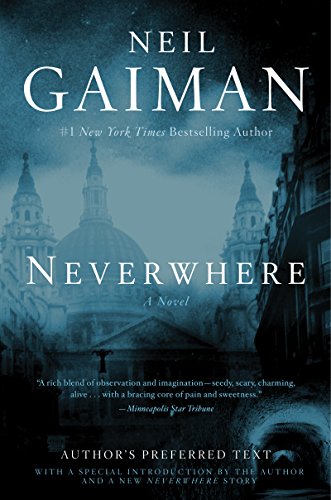[vc_row][vc_column][vc_column_text][/vc_column_text][vc_column_text]If you are at all familiar with Neil Gaiman’s work, you’re probably used to Escher like worlds and mythical scenarios that are somehow bleak, dark, and yet strangely whimsical tales that leave you satisfied that you read a good story, but lacking any desire to inhabit the world he has presented. Neverwhere is the best of all of these things. This story presents the perfect balance of all those traits and leaves you wanting, but not needing more. In fact, Neverwhere is actually in my top 10 favorite books of all time (which is hard to do, I have read a lot of books).
I was introduced to Gaiman through “Good Omens” his collaboration with Sir Terry Pratchett. Maybe one day I will get to do a full review of that book but, needless to say, it’s very different than Neverwhere. You can’t deny Pratchett’s influence on that one. While “Good Omens” remains my favorite of Neil Gaiman’s work overall, as far as his solo tales go, “Neverwhere” takes the cake.
Most of Gaiman’s work is distinctly dreamlike. You put down the book and grasp at the edges of the story, your waking mind trying to hold onto and make sense of what you just read. American Gods is the type of dream that leaves you with unsettled adrenaline, The Graveyard Book leaves you feeling nostalgic, like you’ve grown-up too fast, and the Ocean at the end of the Lane is that slightly scary dream you want to hold onto and dissect, but slips through your fingers like water. Even Coraline is the nightmare of a child. Each one is definitely worth reading, but they all have this similar thread of a dream you didn’t really get to finish.
When compared to his other work, Neverwhere seems be told through a completely different filter. Instead of adding grit and fog to magic, it adds magic to an underworld. Instead of making reality seem unreal, it brings a dose of tangibility to a dream. As you follow Richard Mayhew through London Below, you feel like you are on the quest with him. Seeing through his eyes and experiencing it. It is the dream that you wake up from satisfied and refreshed. You’ve left your reality for a bit but stepped into one that is just as, if not a little bit more, real.
I’m not saying it is altogether a happy book, but it does have one of the happier endings of his work. It definitely has a more complete ending. It leaves you feeling hopeful that there is something beyond the mundane world worth reaching out to, even if it is a little scary. It is his one book that, while being hesitant, I don’t think I would mind so much stepping into with the right guide.
The characters in this book are fantastic. I wish we had more tales of the Marquis de Carabas and was so glad I had the version of the book with his extra story included. I love that Door and Richard’s relationship was ambiguously platonic and a love story wasn’t shoehorned in with a ham hand. I wanted to know the characters more, but still felt like they were old friends. I think that is one of the things that sets Gaiman apart from many other writers. Each and every character you interact with, no matter how passing, feels real and like they have a fully realized story of their own. It’s Fantastic.
I could go on and on about this book and Neil Gaiman’s other work. Suffice to say, I absolutely adored this book. 10/10, would read again and give my enthusiastic recommendation.
[/vc_column_text][/vc_column][/vc_row]


